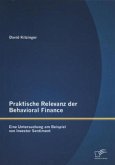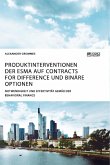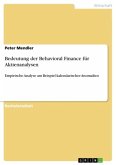Financial markets exhibit dynamics which are not explainable in the traditional economic framework based on the assumption of rationally acting agents (»Homo Oeconomicus«). Even though there is strong empirical evidence that financial markets are highly efficient, the existence of these »anomalies« is well accepted. In the last decades academic studies have revealed dozens of examples of repeated patterns of irrationality, inconsistency, and errors in judgment and decision making. Behavioral finance incorporates this body of knowledge and argues that market anomalies can plausibly be understood using models in which agents are boundedly rational. The book is an ideal reference for practitioners and researchers. It provides valuable insights based on seminal theoretical and experimental work on behavioral finance and market anomalies. The underlying psychological mechanisms and empirical evidence are emphasized. The author also critically comments on the controversial issue of trading strategies that aim to exploit such market anomalies. The book provides an easy-to-read introduction to the recent discoveries of an emerging science connecting finance and psychology.








